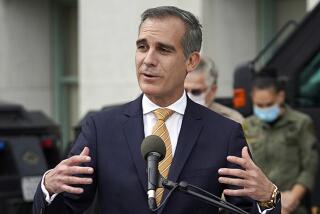Weighing Blame in Ground Zero Delays
- Share via
A plurality of New York state voters can’t figure out whom to fault for the stalled redevelopment of the World Trade Center site, although the largest group puts the blame for the empty skyline above ground zero on Gov. George E. Pataki, according to the latest Newsday poll.
Sixty percent of respondents said they agreed with Pataki and New York Mayor Michael R. Bloomberg that spending on a memorial to the Sept. 11 attacks should be capped at $500 million.
The rebuilding process has been mired in legal battles, political squabbles and backroom deal-making between private developer Larry Silverstein, who holds a 99-year lease on the property, and the Port Authority of New York and New Jersey, which owns the site.
Asked to choose who was at fault for the slow pace of rebuilding -- Pataki, Bloomberg or either of the two key city-state agencies overseeing the process -- 41% of the 1,463 registered voters polled by Blum & Weprin Associates said they didn’t know. The poll had a margin of sampling error of 3 percentage points.
Sixteen percent said the governor, whose legacy might be defined by the trade center, is the elected official most at fault for the delays. Thirteen percent blamed all of the parties; 4% blamed Bloomberg.
In New York City, voters were more willing to cast blame. Only 29% were not sure whom to fault, whereas 22% said Pataki was responsible. Fifteen percent looked to the Lower Manhattan Development Corp., and 12% blamed the World Trade Center Memorial Foundation. Fifteen percent cited all of the above.
“If there are failures in Iraq, everyone blames the president,” said Paul Goldstein, district manager of Manhattan Community Board 1, which represents the area around ground zero. “If there are failures here, everyone will probably blame the governor, since he has been at the front of this issue all along.”
Pataki and Bloomberg each appoint half of the 16-member Lower Manhattan Development Corp. board, and the memorial foundation board approves members recommended by the governor. The city-state agencies then make decisions through their boards.
On spending, 59% of voters statewide -- and an almost even split of 55% in the city -- felt the memorial should be built with no more than $500 million.
The survey results are no wonder, said New York University professor Rae Zimmerman of the Wagner Graduate School of Public Service, who has monitored the rebuilding. If voters don’t know who’s going to pay, “they are going to be very conservative on what the cost should be,” she said.
More to Read
Sign up for Essential California
The most important California stories and recommendations in your inbox every morning.
You may occasionally receive promotional content from the Los Angeles Times.













